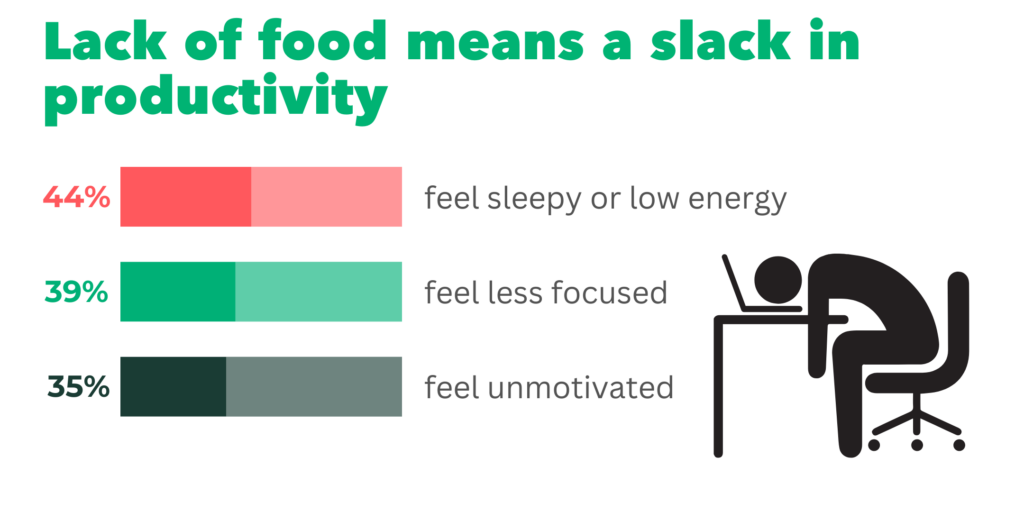Construction workers start their days early and work long, hard hours. But unfortunately, they don’t always get the nutrition they need to safely and efficiently complete their projects.
Based on our 2023 report, Building Stronger Construction Teams Through Food, we found that 87% of construction professionals work hungry. That’s not ideal for their productivity, which affects the entire crew and the client. But thankfully, there are creative ways to help keep your team fed and fueled for the day’s hard work.
You can see the full details in our report, which you can download below. But for a sneak peek, let’s take a closer look at what’s preventing construction workers from getting the fuel they need — and how employers can help improve the situation.

Building is hungry work
A construction crew’s work is physically and mentally demanding — especially when working in freezing or scorching temperatures.
According to a 2019 NIH report, male construction workers experienced an average energy cost of 4.9 calories per minute, which equals about 300 calories an hour. Multiply that over a standard eight-hour shift, and that’s 2,400 calories.
In other words, the minimum amount that construction workers should be eating is 2,400 calories each day. This number can be much higher for people doing more demanding tasks, like shoveling or earthwork.
The issue is that few workers get that many calories. Our survey found that 57% of construction workers start their day with only caffeinated drinks at least three days a week — no real breakfast. And another 13% never eat breakfast. This lack of sustenance and healthy calories takes a toll on their work.

How can someone expect to burn 2,000+ calories when they haven’t eaten anything? Not only does it lower their productivity, but it can put the entire team at risk. About half of those surveyed reported they are worried about making mistakes and risking injuries due to working hungry.
Why construction worker lunch isn’t a priority
Despite these concerns, construction workers don’t prioritize getting a full breakfast or lunch.
One reason for this is time. Most start well before 9 a.m., meaning they might commute at 5 or 6 a.m. (or earlier, depending on how far away the worksite is). That leaves very little time to eat at home or stop and grab food on the way to work.
Then there’s the issue of the time most construction workers have to eat lunch. Our survey found that most workers only get 11-30 minutes to eat, and some skip lunch altogether to focus on their work. If they don’t have enough time to get breakfast in the morning, chances are they don’t have enough time to pack a lunch. That leaves the option of buying food from a restaurant. But going out to buy food can take up some or all of their lunch break.
As a result, the go-to food options for construction workers are fast food chains and gas stations or convenience stores. While they may be getting some calories from that food, they may not be healthy calories. Plus, food high in carbohydrates, fat, and calories can cause sleepiness — not give the energy boost that construction workers need.

In other words, it’s not just about getting enough calories but making sure they are the right type of calories that increase motivation, concentration, and energy.

Food for construction workers = better business
The solution is simple: provide catered food options at work. These could be an occasional tray of sandwiches for the crew or a subsidized meal delivery where the company covers a portion of the lunch costs. Not only does this approach eliminate the need to travel during lunch breaks to get food, but it also means construction workers don’t need to settle for unhealthy options or spend their hard-earned money on food.

Having food options onsite can also increase productivity. Since people don’t have to leave the worksite, they can experience a less stressful transition from work to lunch and back to work. Construction worker lunch can become relaxing and enjoyable again, not just an obligatory break and travel time. And we all know they more than deserve a relaxing lunch break after hours of physical labor.
The findings from our survey highlight this point. Nearly three-fourths of construction workers who receive catered lunches at work feel like they can truly rest during their lunch break.
Despite the overwhelming support for catered food from workers and the clear benefits, not many construction companies implement this benefit — at least not regularly. While 70% of construction workers have received free food at one point, only 29% enjoy regularly catered meals. And 20% never receive any free food.
This lack of food investment affects not only the workers and their productivity but also the overall business.
The U.S. Bureau of Labor Statistics shows a 2.1 quit rate for construction workers in April 2023, which is higher than the mining and manufacturing industries. This number is again rising after a steady drop at the beginning of 2023. One way to ensure construction workers want to say at their job is to incentivize them with perks like free food.
Over 90% of the workers surveyed say that free food is the most appreciated work perk — above flexible work arrangements, wellness benefits, and education assistance. And 75% of construction workers would continue working at a company that offers free meals, showing that catered food is well with the investment.

Make food a priority at your firm
When dealing with such a physically demanding job like construction work, healthy food options shouldn’t be optional. They should be a priority — not only for the health of your workers but for the success of the business. So start making food a priority at your company with things like construction lunch boxes or catered meals.

Learn more about how to feed your entire crew (or the office staff back at HQ) with the help of ezCater’s corporate food solutions.







